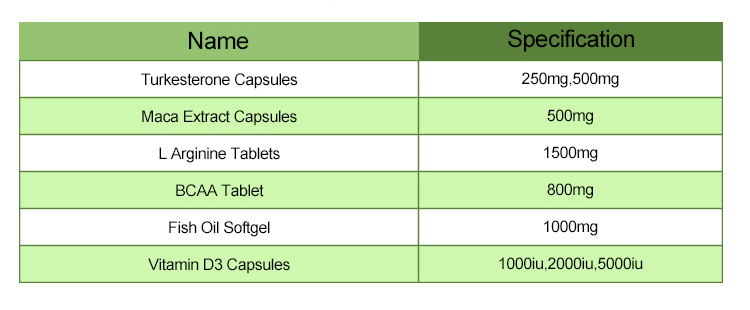Vitamin D3 capsules typically contain the active ingredient cholecalciferol, which is a form of vitamin D that is synthesized in the skin when exposed to sunlight. In addition to cholecalciferol, other ingredients commonly found in Vitamin D3 capsules may include:
1.Gelatin or vegetarian alternative (such as cellulose) for the capsule shell.
2.Carrier oils or excipients, often used to aid in the absorption of the fat-soluble vitamin D3.
3.Antioxidants or stabilizers to maintain the potency and shelf-life of the capsules.
4.Fillers or bulking agents to ensure proper capsule formation and dosing.
5.Sometimes, flavorings or coloring agents may be added, although this is less common for basic Vitamin D3 supplements.
It’s essential to read the ingredient list and consult with a healthcare professional if you have any allergies or specific dietary restrictions. Additionally, the specific formulation of Vitamin D3 capsules can vary between brands and products, so it’s essential to choose a reputable brand and product that meets your needs.

The application of Vitamin D3 Capsules
Vitamin D3, also known as cholecalciferol, is a crucial nutrient for maintaining overall health. Its primary role is to regulate the absorption of calcium and phosphorus in our bodies, which are essential for maintaining healthy bones and teeth. However, it also plays a role in various other bodily functions, including supporting immune function, reducing inflammation, and promoting cell growth and differentiation.
Vitamin D3 supplements, typically available in capsule form, are commonly used to address deficiencies or insufficiencies of this vitamin. Here are some common applications of Vitamin D3 capsules:
Treating Vitamin D Deficiency: Vitamin D deficiency is widespread, particularly in regions with limited sunlight exposure or in individuals who have limited sun exposure due to lifestyle or occupation. Vitamin D3 supplements are often prescribed to treat deficiencies and bring blood levels of Vitamin D back to a healthy range.
Supporting Bone Health: Adequate Vitamin D levels are essential for maintaining bone health. Vitamin D helps the body absorb calcium, which is crucial for bone mineralization. Thus, Vitamin D3 capsules are often recommended for individuals at risk of osteoporosis or other bone-related conditions, especially in conjunction with calcium supplements.
Boosting Immune Function: Vitamin D plays a role in modulating immune function, and its deficiency has been linked to an increased susceptibility to infections and autoimmune diseases. Supplementing with Vitamin D3 may help support immune function, particularly during periods of increased risk, such as winter months.
Reducing Inflammation: Some research suggests that Vitamin D may have anti-inflammatory effects. While more studies are needed to fully understand its mechanisms, Vitamin D3 supplementation is sometimes recommended for individuals with inflammatory conditions such as rheumatoid arthritis or inflammatory bowel disease.

Supporting Mental Health: There is emerging evidence suggesting a link between Vitamin D deficiency and certain mental health conditions such as depression and seasonal affective disorder (SAD). While more research is needed, some studies have shown potential benefits of Vitamin D supplementation in improving mood.
Managing Chronic Diseases: Vitamin D deficiency has been associated with an increased risk of various chronic diseases, including cardiovascular diseases, diabetes, and certain cancers. While Vitamin D supplementation alone may not prevent these conditions, maintaining adequate Vitamin D levels through supplementation may contribute to overall health and disease prevention.
It’s essential to note that while Vitamin D supplementation can be beneficial for many individuals, it’s essential to consult with a healthcare professional before starting any new supplement regimen, especially if you have underlying health conditions or are taking medications. They can help determine the appropriate dosage based on your individual needs and monitor your Vitamin D levels over time to ensure optimal health. Additionally, it’s important not to exceed the recommended dosage, as excessive Vitamin D intake can lead to toxicity.
